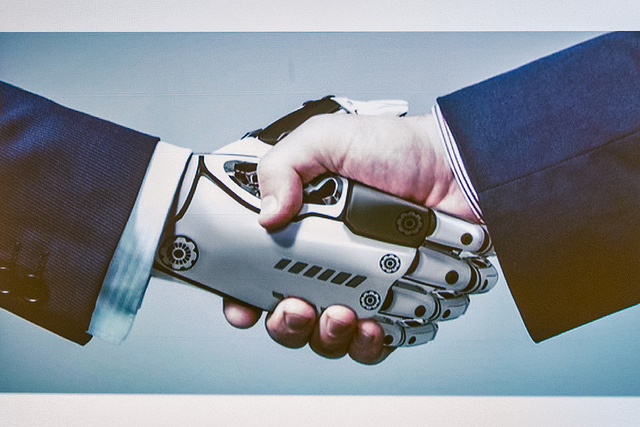
Can God Exist in a World of AI?
- By C Barnett --
- 07 Aug 2017 --

Changes in Technology May Change Religion
Wall-E, R2-D2, and Baymax – these robots are amongst the most beloved film characters from the past few decades. There are distinctly human traits and mannerisms in each of these droids, allowing audiences to bond with them – we laugh at their humor, marvel at their intelligence, and cry at their heartbreaks and sacrifices.
And we often forget that their (albeit fictional) self-awareness is not inherent, but artificially created.
Artificial Intelligence, the capability of a machine to imitate intelligent human behavior, is becoming a growing presence in our status quo. We live in a reality with self-driving cars (Google is even developing ‘artificial moral reasoning’ for decision making about potential accidents), and digital, personal assistants like Siri and Alexa – conscious, functioning AI may be closer than we’d guess.
Can God Exist in a World of AI?[/tweetthis]
In the past few years, AI has advanced so rapidly and significantly that, as of January 2017, the European Union began discussing the establishment of “electronic personhood”, in order to ensure rights and responsibilities for the most intelligent AI.
The European Parliament, in a 17-2 decision, established the need for the following in regards to AI:
- The creation of a European agency for AI
- A legal definition of “smart autonomous robots”, which would take into account the smart robot’s capacity to acquire autonomy through sensors and/or by exchanging data with its environment, its capacity to learn through experience and interaction, its physical form, and its capacity to adapt its behaviors and actions to its environment.
- A code of conduct for engineers aimed at guiding the ethical design, production, and use of robots, including, but not limited to, respecting fundamental rights, and respecting both physical and psychological human dignity.
This motion by the European Union was much more than a piece of legislation – it sent the message to the international community that humanity needs to be thinking harder about the implications of AI becoming self aware, and therefore, independent.
Strong, differing opinions about AI and its future have even led to Elon Musk, the CEO of Tesla, and Mark Zuckerberg, the co-founder and co-CEO of Facebook, publicly clashing over the future of AI, and whether or not it poses a threat.
Zuckerberg blasts @elonmusk warnings against artificial intelligence as 'pretty irresponsible' https://t.co/DzPjvBym7W @svbizjournal #ai
— Darren Cunningham (@dcunni) July 25, 2017
In particular, religious communities have growing concerns about the rise of AI, and how the human creation of such intelligence fits into theology. These groups of people are being forced to ask questions that they had never had to consider – is it morally justified for human beings to create artificial life, or is this a ploy at ‘playing God’? How will AI determine its moral code? Will AI be able to have individual, autonomous opinions and beliefs? If so, how does religion fit into said beliefs? Peter Scott, author of Crisis of Control: How Artificial SuperIntelligences May Destroy or Save the Human Race stated:
“What makes it of vital broad interest now is that recent developments have shrunk that horizon, considerably. Stephen Gold, a vice president at IBM Watson predicted that a computer would pass the Turing Test by 2020. He was referring to a more lenient form of the test that would be enough to fool the average observer and not the battery of experts that would doubtless interrogate an AI in a court determining its human rights. But this would still be a landmark in the evolution of ‘thinking machines” that would tip the public debate into overdrive.”
And, maybe most importantly, if humans are able to artificially design and create life, what makes our own creation at the hands of a Creator so significant?
Kevin Kelly, the author of The Inevitable: Understanding the 12 Technological Forces That Will Shape Our Future argues that “if humans were to create free-willed beings, absolutely every single aspect of traditional theology would be challenged and have to be reinterpreted” – however, the threat of theological reinterpretation is a modest one when compared to the possibility of the concept of God becoming obsolete.
There are clear historical precedences for scientific progress to cause religious disruptions at massive scales – Galileo promoting the model that the Earth and other planets revolve around the Sun, which is at the center of the solar system, directly clashed with the Christian interpretation that the Earth was the center of the universe. This was one of the first recorded times in which the Christian foundation of science, one that was seen to be indisputable, was shaken.
Examinations of the progress of science, from Galileo’s proposal of heliocentrism to Charles Darwin’s theory of evolution, have shown that our world, one that was once easily comprised of a Christian majority, is becoming increasingly disillusioned to the idea of God as humanity moves into an era where scientific fact is held above all. The concept of a mainstream belief in God surviving the creation of artificial, intelligent, autonomous life is questionable, at best.
It’s impossible to deny that AI will become an inseparable component of our day-to-day lives within the next few decades. However, we as human beings will be required to undergo a period of serious moral, ethical, and theological dilemma, and adjust our perception of reality when we, the created, become the Creators.



















